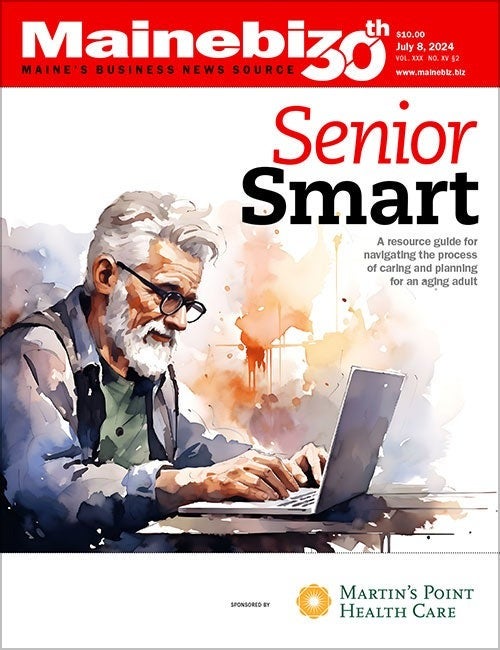
Retirement resets: How some Mainers are scripting their own ‘Great Retirement’ paths
Don’t refer to John Burns as retired. “That word just kind of grates,” the 66-year-old former leader of the Maine Venture Fund says from Desert Hot Springs, Calif., the latest stop on a family road trip that started six months and 16,000 miles ago.
“I don’t think of myself as retired or retiring,” he says. “It’s about rewiring, refreshing, retooling and getting ready for what’s next.”
At a time when millions of older Americans are leaving long-time occupations — in some cases even before reaching Social Security eligibility at age 62 — many are also rewriting the script on what retirement means.
With longer lifespans than previous generations, many are seeking to make the most of their post-career lives. Frequently, those with the financial means and the health to stay active take a break before their next adventure.
As Burns takes his time in what he calls his “interim chapter,” he’s putting in 10 hours a week as a paid part-time strategic advisor to the venture capital fund he led for more than two decades. When not attending to daily chores associated with setting up and breaking camp in a used Airstream trailer pulled by a Ford F-150 pickup truck or homeschooling his 13-year-old daughter in geography, he hikes, bikes and reads for pleasure.
“When I was working most of my reading was work-related, and it would take me weeks to go through a novel,” says Burns, who’s now breezing through books from George Eliot’s 1861 novel “Silas Marner” to modern fiction.
“I’m looking for my next classic,” he says. He also looks forward to his next professional chapter, whatever that may be.
So does Michelle Rich, a 62-year-old former human resources manager who retired early to focus on her family and herself before she decides her next move. The Brunswick resident retired at 60 from Swedish-owned Modern Pest Services after staying on a few months longer to help train her replacement at the start of the pandemic. As she thinks about becoming a wellness coach, she’s making the most of her new free time. That includes taking up power walking, with the goal of eventually entering a marathon.
“Too many people are caught up in the treadmill of life,” she says. “But taking care of yourself is not about diet, it’s about food management, and you don’t have to fix everything. It’s also at the end of the day sitting down before you go to bed and asking, ‘What’s one good thing I can pull from today that was positive for me?’”
Retirement boom and baby boomers
Across America, around 33 million people of all ages have quit their jobs since spring 2021 in the ongoing Great Resignation. The early retirees among them are part of what’s becoming known as the “Great Retirement.”

A report released in January by the Federal Reserve Bank of St. Louis documents the surge. Using data from monthly population surveys, researchers estimate that there were 3.3 million or 7% more retirees as of October 2021 than in January 2020. The increase is largely among those ages 65 and older, with notably stronger growth among those ages 65 to 74.
For some, recent record levels in the value of assets, such as investments and residential real estate, along with liquid cash support from government stimulus checks during the pandemic, have made the decision to retire easier, at least from a financial standpoint, the authors found.
Women retire earlier than men, in part because they are younger, are more susceptible to layoffs and forced retirements and more likely to be caregivers, according to Lowell Ricketts, a data scientist at the St. Louis Fed’s Institute for Economic Equity who co-authored the report.
He also says that while the report doesn’t reflect retirees transitioning from full-time to part-time status, that’s an area “worthy of further research.”
While retirement means different things to different people, traditional notions of babysitting grandchildren, swinging golf clubs or playing cards are giving way to a new mindset about staying active and finding fulfillment in volunteering or paid work, or traveling and learning new skills. That’s especially true of baby boomers, the generation born between 1946 and 1964.
One report documenting the trend was put out by the Transamerica Center for Retirement Studies in August. Out of 573 boomers surveyed for the study, seven of 10 are currently working or expect to work past age 65 or do not plan to retire at all, while eight in 10 have a strong sense of purpose and consider themselves to be in good or excellent health. On the flip side, only three out of 10 respondents have a backup plan for retirement income if forced to leave the workforce early, and only one out of five were very sure of their ability to retire comfortably.
While some retirees reenter the workforce because they need the money, Barbara Babkirk, a Portland-based career counselor and transition coach to professionals ages 50 and older, finds that working retirees are motivated mainly by purpose and sociability.
“I met with a client last week who said, ‘After two years I really need to go back to work.’ He thought writing would be enough, but what he really misses is being in the mix,” she says. “Boomers are not interested in sitting still, they’re interested in being intellectually engaged and feeling like they’re making a contribution.”
Former Procter & Gamble executive Nancy Strojny feels that way after more than a decade with SCORE, a nationwide network of volunteer mentors to small businesses. Strojny, 72, became SCORE Maine assistant district director in October 2020. She says she plans to stay with the organization “as long as I can make a difference,” adding: “You can’t keep a baby boomer down.”
A new vocabulary
The new retirement mindset is also sparking a whole new terminology. “Pre-tired” is a favorite of Rick Francis, a Scarborough-based consultant to religious organizations across New England through the nonprofit Cecil B. Day Foundation after a varied career in several industries.
“Officially I no longer have a full-time position, but I cobble all these little things together just to keep myself busy,” the 69-year-old says. “I don’t know if I’ll ever fully retire.”
At 65, former Bernstein Shur CEO Patrick Scully isn’t ready to retire either, and was recently named to the Maine Public Utilities Commission.
“Retiring into the beginning of COVID,” he says, “I realized very quickly I wasn’t ready to be done.”
Similarly, Patricia Weigel still chairs Norway Savings Bank’s board and serves on various committees after retiring recently as the bank’s CEO. The 62-year-old has taken up Nordic-style skate skiing, and sets weekly goals for herself as she did in her working life: “I have always been a curious person who’s liked to learn a lot,” she says. “That hasn’t changed with retirement.”
Kitchen work for a cause
Like Strojny, retired insurance executive Tom Heckel has found new purpose through volunteering, in his case for My Place Teen Center in Westbrook. The 60-year-old started there in 2020 while working remotely, keen to get out of the house and interact with others.
“Zoom is great, but it was just so unsatisfying,” says the former vice president of actuarial at Disability RMS, an insurance agency acquired by SunLife Financial in 2015.
Familiar with My Place Teen Center and the nonprofit’s executive director, Donna Dwyer, Heckel raised his hand to help during the pandemic. He told Dwyer that he’d do anything, and the nonprofit put him to work delivering meals to families in need and other tasks.

He initially helped with outdoor maintenance and random kitchen tasks and has lent a hand in the kitchen two days a week since retiring last November. The center serves up to 50 hot meals daily after school and runs a restaurant training program for teens.
“I peel a lot of potatoes and dice onions,” says Heckel, an amateur home cook who’s learned a lot at the center. “That way when the kids come in, they can focus on other stuff.”
Unsure where the experience will lead him, Heckel finds giving his time to be more gratifying than donating money.
“When I was working, I would give charitable contributions, but the only thing I gave of myself was blood, and I felt that was not adequate,” he says. “Being able to be there when the doors are open is as important as my need to do something other than write a check.”
That’s welcome news to the nonprofit, after seeing its volunteer corps drop from 120 people putting in 6,000 hours a year pre-COVID to 25 volunteers contributing 1,000 hours today.
“Without good-hearted, diligent, accountable souls like Tom, our mission would not function,” Dwyer says. “Volunteering is the linchpin of joyful satisfaction.”
Boating, baseball and back to Blue Hill
For some retirees who prefer to keep working, it’s not always about the money.
Take Dennis “Chip” Martin, a 59-year-old boating enthusiast who spent 25 years in the environmental remediation and construction industry. He’s financing his retirement from real estate investments going back to 1995.
From early May through late October, Martin is employed as Freedom Boat Club’s dockmaster at Portland’s Fore Points Marina and South Portland’s Sunset Marina.
The Massachusetts native originally connected with the franchise as a member. As an employee, he gets even more of an opportunity to be out on the water; he also likes the flexible hours and working with young people and can’t wait until April 8, opening day at Hadlock Field.
“I’m starting to get bored,” he says. “I feel like I need to get to work. There are little things to do around the apartments, but I like to be engaged and the customer contact,” he says. “People are generally having a good time when they’re out on the water.”
More than six years after retiring from his longtime occupation, Martin says, “I don’t think I would ever go back to the 9-to-5 road-driving thing again … I could drive a boat all day and be perfectly happy.”
Freedom Boat Club franchise owner Steve Arnold is happy to have Martin on the team, and envisions his own retirement as scuba diving around the world.

Scarborough resident Rod MacPhie, 74, is equally enthusiastic about ushering at Maine Portland Sea Dogs baseball games, after a career in sales including a decade with Utz Brands Inc., where he was an assistant district manager for Cumberland and York counties.
His duties as a Sea Dogs ambassador range from greeting fans at home games and helping people with disabilities, to showing college interns the ropes; outside of baseball season, he ushers at Maine Celtics basketball games.
“I’ve been a Sea Dogs fan since they started in 1994, and now I can go to all the games,” says MacPhie. “I worked until I was 67 and now I get to play.”
Meanwhile in California, John Burns and his family were getting ready to head to Baja, Mexico, for a few weeks before driving up the coast and then homeward across the Trans-Canadian highway to Blue Hill by June. That’s when his next journey will begin.

Women are more likely to get laid-off then men? I'd like to see data to support that claim.















1 Comments